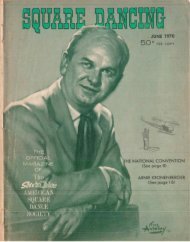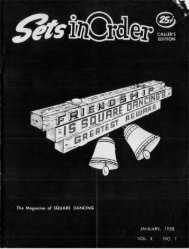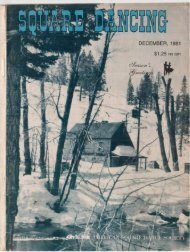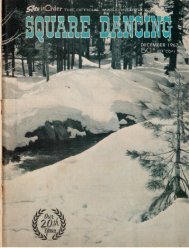- Page 2 and 3:
KYNEWISBOK 71 is the seventy-third
- Page 7:
I wonder when,the beginning of the
- Page 11 and 12: 8UGENERALFr,shmtJnEIIGL/SN,2
- Page 13: Thrust in among the books,the faces
- Page 17: You are different everydayA progr
- Page 21: To be a part ofeverything that touc
- Page 26: The worlds inside you:the dreams, t
- Page 29: The situationsThe soundsand the mot
- Page 33: The intellect of manis forced to ch
- Page 38 and 39: "At that time Iwould not have cared
- Page 40 and 41: Director of PlacementsB.A., M.A.- U
- Page 42 and 43: " ... I see the role of the Vice Ch
- Page 44 and 45: "We have enoughproblems right now t
- Page 46 and 47: It is important to note that the ro
- Page 48 and 49: ... 'you have finally convinced met
- Page 50 and 51: "We have been thrust into an urban
- Page 52 and 53: "People cannot escape having a fait
- Page 54 and 55: Dr. Donald Belden is in his fifteen
- Page 57 and 58: Technological development is an imp
- Page 62: Another problem is that of abandone
- Page 67 and 68: Steven Bennett AbramsChicago, Illin
- Page 69 and 70: Ronald Everett BedellPenacook, New
- Page 71 and 72: Rebecca Susan BrymerSylvania, OhioR
- Page 73 and 74: Scott Charles DeanerWestminster, Co
- Page 75 and 76: Curtis Helmut EngelmannWilmington,
- Page 77 and 78: Cindy Ellen GoldsteinDenver, Colora
- Page 79 and 80: janet B. HanzalekRamsey, New jersey
- Page 81 and 82: Ralph Henry HopfenbergUniondale, Ne
- Page 83 and 84: Ellen SzitaPolitical ScienceI have
- Page 85 and 86: Scott A. LancelotDenver, ColoradoMa
- Page 87 and 88: John Jewett Lowrey, Jr.Honolulu, Ha
- Page 89 and 90: Evelyn Kay McDivittLa junta, Colora
- Page 91 and 92: Thomas A. NeillEvanston, IllinoisDe
- Page 93 and 94: Sue C. ParrottMinneapolis, Minnesot
- Page 95 and 96: -.,,,;' , .... ,,•.. 4 I'92
- Page 97 and 98: Shirley Fay RussellDenver, Colorado
- Page 99 and 100: William james Sheppard, Jr.Watsonvi
- Page 101 and 102: Kendra Kolehma StrawWaukegan, Illin
- Page 103 and 104: Ruth Alger VucichLittleton, Colorad
- Page 105 and 106: Sarah Parkman WilliamsDedham, Massa
- Page 107: 104
- Page 111 and 112:
108The time is fitting that man fun
- Page 113 and 114:
PanhellenicI am as diverse and indi
- Page 115 and 116:
Not shown:Nancy WanishJudy RayWendy
- Page 117 and 118:
1. Debbie Blanchard 13. Hollie Harr
- Page 119 and 120:
Kappa DeltaThe most I can do for my
- Page 121 and 122:
118Not shown :Dede RushtonSue Shube
- Page 123 and 124:
120
- Page 125 and 126:
122
- Page 127 and 128:
Sigma Delta Tau"We are here to add
- Page 129 and 130:
La, I am black, but I am comely too
- Page 131 and 132:
128
- Page 133 and 134:
Executive CouncilOrder of Omega1. S
- Page 135 and 136:
Alpha Kappa PsiTo a lot of Denver s
- Page 137 and 138:
The Alpha Zeta Chapter of Beta Thet
- Page 141 and 142:
138
- Page 143 and 144:
Not shown:Steve BaerJames Bergstrom
- Page 145 and 146:
'II II ,1/142
- Page 147 and 148:
Not Shown:Daniel ArizumiPete AsherT
- Page 149:
Theta ChiTheta Chi ...United by Bro
- Page 152 and 153:
~~~--------------------~~~~--------
- Page 154 and 155:
... Hi, Mom. No, your roof wasn't f
- Page 156 and 157:
1. Ji m Ro be rts2. Ru ss Sto ut3.
- Page 158:
What we cannot do for a lifetime we
- Page 161 and 162:
158FallSports
- Page 163 and 164:
Varsity Water Polo RosterBruce Ande
- Page 165 and 166:
The Air Force Academy game usually
- Page 167 and 168:
Varsity Soccer RosterWeSeason Summa
- Page 170 and 171:
Going to a women's sporting event i
- Page 172 and 173:
168WinterSports
- Page 174 and 175:
After nine consecutive winning seas
- Page 176 and 177:
It was nerve-racking for many. Afte
- Page 178 and 179:
'-..J ~ -- '---jim Karabetsos173
- Page 180 and 181:
Varsity Hockey RosterRick BragnaloM
- Page 183 and 184:
Murray ArmstrongVarsity Gymnastics
- Page 185 and 186:
180Spring Sports
- Page 187 and 188:
Varsity Lacrosse RosterHarris KuhnW
- Page 189 and 190:
Tennis was another Spring Sport tha
- Page 191 and 192:
Varsity Tennis RosterMike BrewenJoh
- Page 193 and 194:
Although often considered to have o
- Page 195 and 196:
Intramural WinnersAll School Champi
- Page 197 and 198:
Every man must justify his existenc
- Page 199 and 200:
~~victories that are easy are cheap
- Page 201:
196
- Page 206 and 207:
Experience is the child of thought,
- Page 208 and 209:
Where the rivers of timeAre fouled
- Page 210:
205
- Page 213 and 214:
208
- Page 215 and 216:
The Denver media called it a shanty
- Page 217 and 218:
Woodstock West ...Nation of Peace a
- Page 219 and 220:
All I can think of is flying a kite
- Page 221 and 222:
215
- Page 223 and 224:
Fall Festival orNovember Nonsense?2
- Page 225 and 226:
219
- Page 227 and 228:
Why is it that those elements which
- Page 229 and 230:
The Theatre ...a Victim of Misdirec
- Page 231 and 232:
The barracks are still on cam pusde
- Page 233 and 234:
227
- Page 235 and 236:
229
- Page 237 and 238:
Almost without question, the most p
- Page 240 and 241:
May Days"\tV erequashed .../234
- Page 242 and 243:
Herb Kaplow~~Great Issues of Our Ti
- Page 244 and 245:
238Eugene McCarthy
- Page 246 and 247:
Disruption was inherent in the appe
- Page 248 and 249:
Winter Quarter, 1971, saw the initi
- Page 250 and 251:
It's purpose is toextend the learni
- Page 252 and 253:
. .. .\ ? upThe Union -the epitome
- Page 254 and 255:
248... being President
- Page 256 and 257:
There were a lot of new faces compe
- Page 258 and 259:
Students were not the only group wo
- Page 260 and 261:
... flaming-women's libtradition ..
- Page 262 and 263:
WinterCarnival;the big event -The t
- Page 264 and 265:
... the best of adifferentculture .
- Page 266 and 267:
They are a new generation; each dif
- Page 268 and 269:
262Others rebel in a soft murmur, t
- Page 270 and 271:
264
- Page 272 and 273:
266
- Page 274 and 275:
268They are optimistic and moral, b
- Page 276 and 277:
270~ ... it just happened."
- Page 278 and 279:
If people need us""e're around272
- Page 280 and 281:
~ ... at leastit's a start.""The Ed
- Page 282 and 283:
276
- Page 284 and 285:
... the prejudicesare more subtle .
- Page 286 and 287:
280
- Page 288 and 289:
282
- Page 291 and 292:
the dogmas of the quiet past are in
- Page 293 and 294:
287
- Page 295 and 296:
A love of music and the desire to s
- Page 297 and 298:
Circle K, I to r: Reid Pixler, Jack
- Page 299 and 300:
L to r, top row; Marie Friedmann, P
- Page 301 and 302:
L tor, row 1; Conrad Lorbiecki, Gen
- Page 304 and 305:
As a service organization, the DURo
- Page 306 and 307:
300
- Page 308 and 309:
AWS wanted to create its own revolu
- Page 310:
304
- Page 313 and 314:
What in the hell can studentgovernm
- Page 315 and 316:
309
- Page 317 and 318:
WITHINWithin the pages (8, 12 or 28
- Page 321:
WHAT the hell is a kynewisbok?What
- Page 325 and 326:
319
- Page 327:
321
- Page 330 and 331:
Abr~ms, Steven - MarketingBernell,
- Page 332 and 333:
Hirschboeck, Katherine - Elementary
- Page 334 and 335:
Ramsberser, Tho mas -Ralh, Deborah
- Page 336 and 337:
IF YOU DON'T FIND US HERE ...A. U.S
- Page 338 and 339:
Eilering, Lance . . . . . . . . 71E
- Page 340 and 341:
Sander, Rickie . . . . . . . . . .
- Page 342:
KYNEWISBOK 71EditorCopy EditorsEduc













